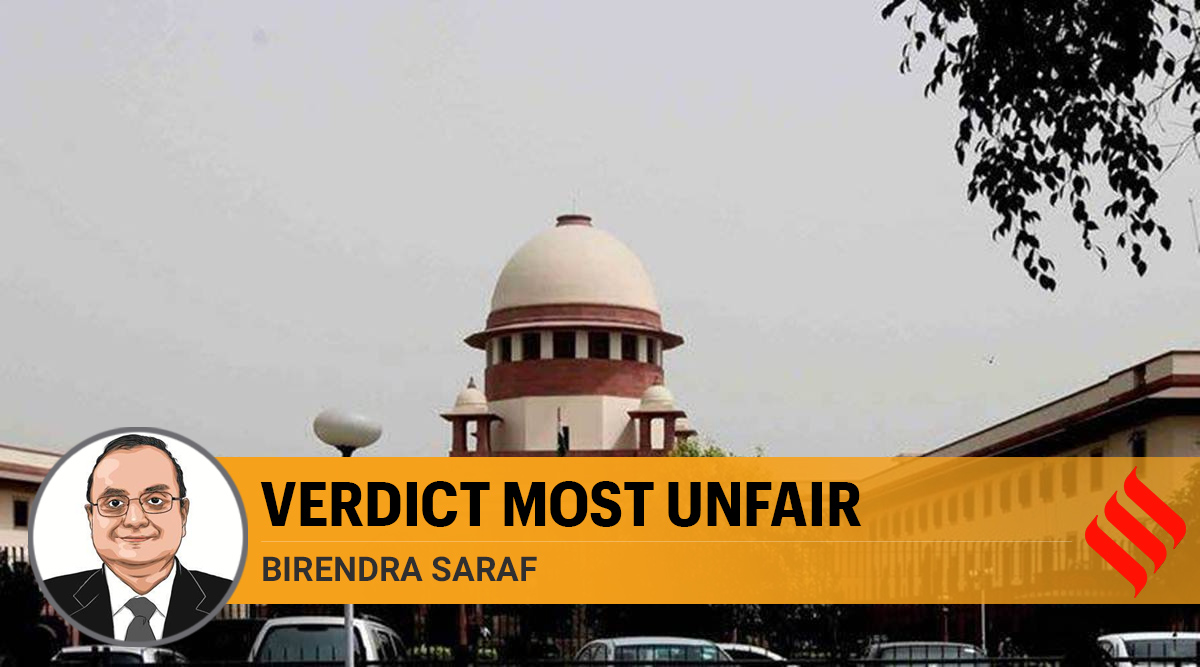 The Supreme Court of India. (Express Photo/File)
The Supreme Court of India. (Express Photo/File)Despite the highest regard I hold for Pratap Bhanu Mehta, I wish to express strong disagreement with his views expressed in the article, ‘Their Lordships and Masters’ (IE, November 18). My opposition stems from not only the deepest respect I have for the judiciary, but also from an awareness of the limitations and burdens with which our judiciary is dispensing justice. I am alarmed by the unfounded blanket criticism and find it an unwise and rash attempt to diminish the faith of the public in an institution, which is the strongest pillar on which the edifice of Indian democracy stands.
Mehta’s term — “judicial barbarism” — is an extremely unjust and unfair description of the conduct of the Supreme Court. It implies a cruel, harsh and brutal behaviour, devoid of any culture and civilisation. India ranks in the top one-third of nations in efficiency of the legal framework to challenge regulations and in judicial independence. The Indian judiciary must be hailed for the rapid strides it has made, bringing positive changes in every sphere of the citizens’ life. At the cost of being criticised for over-interference, the courts have strained to protect the life, liberty and the quality of life of citizens. Any implication that the SC is barbaric displays a disregard for the social responsibility that accompanies freedom of speech.
Mehta draws a parallel to the judicial crises in Poland, Hungary and Turkey. Such a comparison is unjustified and unfounded. In Poland, a legislative proposal aimed to ban judges from obeying the orders from their own Supreme Court making them liable for prosecution. The situation prompted the judges of nearly 20 European countries to join Polish judges and lawyers in a silent march across Warsaw. In Turkey, President Erdogan sacked thousands of judges and prosecutors and replaced them with government loyalists. By a new law, most of the 711 judges of the two highest courts will also be removed. Hungary is planning to create a government-influenced court system, apart from the ordinary courts, to establish direct political control over the judiciary. These situations are not comparable to the Indian scenario and any allusion to the same is far-fetched.
Critics have also expressed reservations over a recent statement by Chief Justice S A Bobde expressing the intent of the SC to discourage the use of Article 32. This statement is being misread to claim that the courts are declining to protect the fundamental rights. The words of the Chief Justice of India were clearly intended to discourage frivolous petitions and reduce the immense backlog in the SC. Justice Bobde also said since the high courts are equally suited to deal with such issues, it would be apposite to approach them first. This, by no means, is an indication that the SC has shut its doors to deserving and meritorious Article 32 petitions.
No institution is perfect, the Supreme Court is no different. Criticism is the hallmark of a thriving democracy, but unfounded and unrestrained armchair criticism is detrimental rather than contributive. It demoralises and destroys institutions. It is this Supreme Court that has so fiercely guarded the fundamental right to privacy. This same SC directed a floor test within 24 hours in Maharashtra that led to the resignation of Devendra Fadnavis as chief minister. It upheld liberty by defending LGBTQ and transgender rights, ruled in favour of women in the Army, guaranteeing them the same terms of employment as men, and upheld the supremacy of the RTI Act over the Official Secrets Act. This SC brought India’s most polarising case to a peaceful close through its Ayodhya judgment. To call such a judiciary barbaric and, in a subsequent supporting article (Navroz Seervai, ‘Giving up the good fight,’ IE, November 20), describe the judges as “savagely cruel and harsh, shorn of any vestige of a judicious temperament” is most imbalanced and prejudiced.
India’s overworked judiciary has, despite all odds and limitations, been an epitome of a free and independent judiciary worldwide. Since comparison is being drawn with other countries, let us be aware that the US Supreme Court only accepts 100-150 of the more than 7,000 cases it is asked to review annually, declining to hear even sensitive cases like a constitutional challenge to the California law that prohibited state authorities from assisting federal immigration agents, which was upheld by the court of appeals. Between 2007-2019, the US SC decided only 991 cases, an average of 76 cases a year. In 2016-2017, only 92 cases were heard by the UK SC. A comparison of these numbers with the burden on the Indian SC reveals the unfairness of the criticism that it has not heard expeditiously some cases perceived by some as most urgent or going “to the heart of institutional integrity of democracy”.
The eminent jurist, Upendra Baxi, has put forth eloquently that the endeavour to judge our justices “is a socially responsible task which may not be performed by indignation entrepreneurship”. His observation that the Supreme Court has been able to uphold the principles of human rights that even the Constituent Assembly could not guarantee holds true.
The critics of the Court have displayed an increasingly disturbing trend — to focus purely on the negatives and conveniently brush past any of the accomplishments, referring to them as isolated instances of relief or an attempt to create a “veneer” of respectability for the institution. Such caustic criticism “strips the tree of both caterpillars and blossoms”. Let us try and strengthen institutions with balanced and constructive critique and not slowly nibble at their foundation by constant badgering and berating. Let us not undermine people’s confidence and faith in the rule of law.
This article first appeared in the print edition on November 24, 2020 under the title ‘Verdict most unfair’. The writer is a senior advocate and Secretary, Bombay Bar Association.